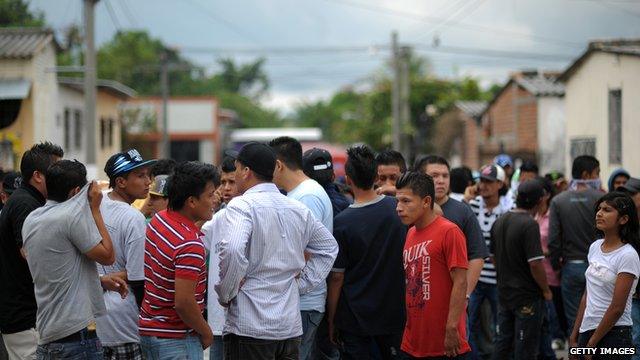Head teacher abuse allegations shock El Salvador
- Published

El Salvador has one of the highest rates of child homicide in the world. According to Unicef, nine out ten cases of sexual abuse of women in the country concern under-18s.
UN figures list El Salvador as one the worst countries for violence against children in the world - but an alleged case, external of abuse and rape by a head teacher, being widely shared online, has still shocked people there.
The allegations in the story come from an anthropologist, Juan Jose Martinez, who was doing research for Unicef, the UN children's fund, in gang-controlled areas. He says he noticed a head teacher at a publicly run school, who openly sexually abused and raped female pupils as young as 12 on a daily basis, and apparently behaved violently towards male pupils too.
The allegations themselves haven't yet been independently substantiated - in part because the school is in a difficult to access area controlled by gangs. Though horrific if true, it wasn't the facts of the case that seem to have shocked Salvadorians most. Instead, the anger seems directed at the inaction of the authorities, which felt like a "slap in the face" to many.
In an online article about his experiences, Martinez details how he tried to report the case to the authorities, without success. "What really surprised me was the reaction of the institutions which, at least in theory, are meant to tackle this violence. Particularly Unicef," he says.
The UN agency has a longstanding presence in the country, though it has no direct control or responsibility over schools and works only in partnership with local authorities and institutions. Unicef advised Martinez about how to pursue the case but he maintains he is frustrated with them. "I had assumed that they would be able to do something about cases of sexual abuse - if only because they have a bigger megaphone to raise the alarm than I do," he told BBC Trending.
Unicef confirmed that Martinez raised the issue with them. However, their role is not "to pick up individual cases," they told BBC Trending. "We had a conversation with him, he presented the information to us and we gave him -as our role is- the list of the institutions that provide advice [about that issue]," Unicef country representative Jonathan Lewis said.
Martinez took this advice and approached several government bodies. El Salvador's Attorney for Children and Adolescents Human Rights, Margarita de Guardado, told BBC Trending that they are now aware of the article and are following it up, but that in fact they weren't told by their officials about Martinez' original complaint.
Martinez was so frustrated by official inaction that he opted for a different megaphone: an online magazine called Factum. His article about the case got over 40,000 views, 4,500 likes and more than a thousand comments on Facebook. "How sad to see these things and not do anything," wrote Facebook user Mirna Hurtado. Another, Alejandro Garcia commented: "Gang violence just shows how insensitive our society is... We don't want to see what's right in front of us."
Martinez says he didn't expect this kind of reaction: "The fact that the middle and upper class, who are the ones with Internet access, were shocked and surprised by this article shows how little they know about poor neighbourhoods. We just need to spend five minutes of our time to speak with our housecleaner in order to realise how brutal life in those communities is."
Blog by Gabriela Torres
More from BBC Trending: Islamic State go niche on social media
Or maybe you'd like to read: 'Blue Lives Matter' trends after officers shot in Ferguson
You can follow BBC Trending on Twitter @BBCtrending, external, and find us on Facebook, external. All our stories are at bbc.com/trending.